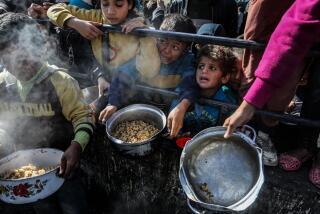Iraq observations cut to the bone
- Share via
IN April 2003, 19 days after U.S.-led coalition forces attacked Baghdad, orthopedic surgeon Jonathan Kaplan arrived in the war zone to volunteer his expertise once again. He had served in several conflicts previously, including in northern Iraq during the Persian Gulf War as well as in Angola, where hostilities had dragged on for more than a quarter of a century. In Iraq, he found many civilians among the casualties -- despite Bush administration claims that only military facilities had been targeted -- and that “most problems could not be solved with surgical skills,” he writes in a revealing new memoir, “Contact Wounds: A War Surgeon’s Education.”
Kaplan, a South African who studied medicine there and in England, supported himself with various interim healthcare jobs, journalism, documentary filmmaking and consulting on TV medical dramas. But his true calling became contributing to medical relief efforts in troubled regions. Since his purpose is humanitarian and his observations are those of someone whose national agenda neither biases nor restricts his opinions, his account of events in Iraq offers a valuable outsider’s perspective. His education becomes ours.
Amid continued bombing that damaged Baghdad hospitals and clinics along with intended targets, medical staffs struggled to cope as supplies dwindled, electricity failed and fuel shortages meant using generators only sparingly, Kaplan writes. Without working elevators, the wounded had to be carried to upstairs operating rooms. Water arrived in buckets, instruments could not be sterilized so all but the most urgent surgeries were delayed to avoid infection. Doctors “fought looters trying to strip the pharmacies”; gun-wielding relatives of patients fought off gangs armed with AK-47s “to stop the beds themselves being taken and sold.” Even a tea break was impossible, the surgeon was told at one site he visited: Looters had stolen the kettle and cups.
“It seems inconceivable that no strategy existed to restore order in Baghdad,” he writes of the protracted destruction and lawlessness in Iraq. Aid workers, journalists and some of Kaplan’s Iraqi colleagues started to wonder whether the chaos was actually a plot designed to destabilize the situation further.
In Iraq, Kaplan was a primary caregiver part of the time. He also helped to assess which facilities could accept and treat patients, which required him to travel around the city, putting him at increasing risk as locals grew distrustful and angry at foreigners. He describes gutted buildings, tanks blocking intersections, dirt roads muddy with raw sewage, children playing in garbage piles, burning vehicles, spilled fuel, ash falling from the sky. “Some patients had been injured by the world’s most advanced weaponry,” he writes, yet “there was no commensurate sophistication in the treatment available.”
These experiences, described near the end of his book, are all the more powerful and poignant after earlier chapters recounting a childhood of upper-class privilege -- Kaplan’s family employed a number of servants and gardeners. He admits to being a “trouble-maker” at school and largely oblivious to apartheid and South Africa’s stratified social structure. A summer at an Israeli kibbutz in 1968, however, not only introduced the 14-year-old Kaplan to racism and poverty, but it also ended his worship of the glories of battle when a shockingly violent air show of U.S.-supplied jet fighters and bombs led him to decide modern war meant “devastating wounds; scant heroism; indeed, hardly any chance of surviving that obliterating inferno.” Kaplan’s recurrent themes are racism, poverty and the allocation of scarce resources not for education or medicine but for bombs and bullets. He begins to see the altruism of the groups he serves fading, becoming a “not-for-profit aid industry,” as agencies compete so avidly for funding that he was even coached on how to make a good impression when interviewed.
Without the restoration of order or basic services in Iraq, workers for the United Nations, the International Red Cross and many other groups found themselves threatened, attacked and even killed. Kaplan says that before the war in Iraq, rewards far outweighed dangers for volunteers. They had been protected and appreciated by the people they came to help. No longer. Now targets for abduction and murder, some -- including Kaplan -- think their calling may no longer be tenable.
“Perhaps it is time for me to renounce those dreams,” he writes. “But every day I read the war news like job-vacancy ads, looking for peace.”
Irene Wanner is a critic and author of “Sailing to Corinth.”
More to Read
Sign up for Essential California
The most important California stories and recommendations in your inbox every morning.
You may occasionally receive promotional content from the Los Angeles Times.












